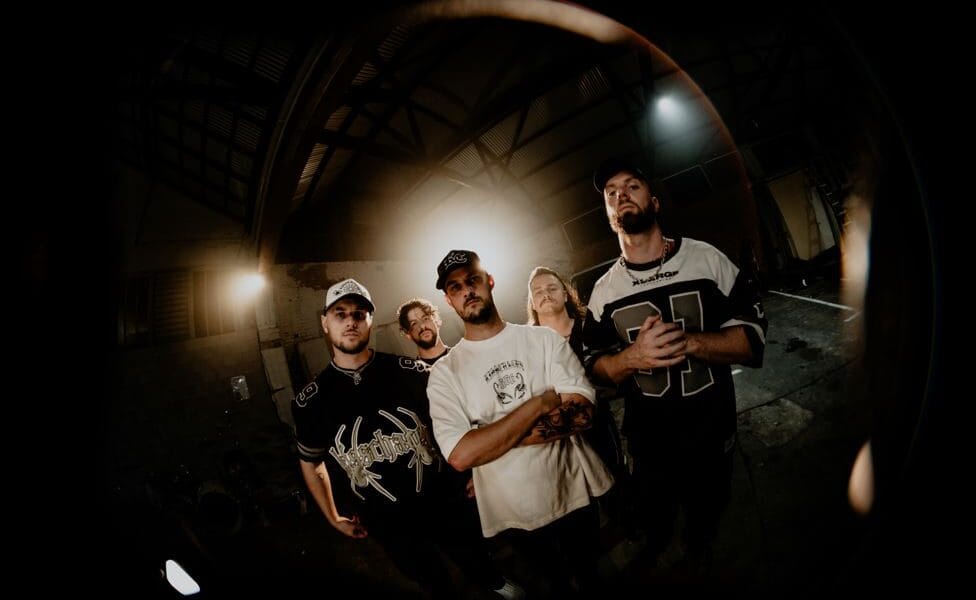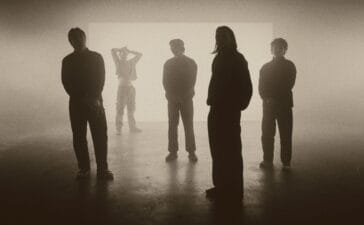Sydney’s alternative scene has always thrived on innovation and attitude, and Deficit are out to prove their natural place in the thick of it. Emerging from the city’s heavy underground, the five-piece are carving their own path with a carefully crafted sound and aesthetic.
Across six tracks of volatile, genre-bending fury, Deficit bottle the burnout, bravado, and dark humour of modern youth culture into something entirely their own. They call it Deathstyle.
“’Death’ refers to our roots in Metal, Hardcore, Death Metal, and Deathcore,” says the band. “While ‘Style’ captures the groove, catchiness, and swagger that define our identity. It’s the definition of Deficit’s own unique genre.”
“We take influence from bands like Limp Bizkit, Sevendust, Machine Head & Biohazard, but we’re not trying to recreate anything. We’re just building on what shaped us.”
Deficit’s new EP, DEATHSTYLE, out next Friday 21 November, embraces experimentation while staying true to their core, and evokes far more than just another genre tag – it’s their statement of identity. The music is heavy and unpredictable, but it’s also self-aware and loaded with personality, merging streetwear swagger with mosh energy and a healthy dose of irreverence.
Yesterday, the band shared the last taste of their upcoming EP with ‘FINAL BOSS’ – a ferocious track about resilience and defiance, and transforming pain and hardship into strength.
This evolution sees Deficit remaining grounded in their nu-metalcore roots while pushing the boundaries outward, pulling in touches of industrial, hardcore, late 90s/early 2000s metal, and even dark ambient textures. The breakdowns get heavier. The riffs thicken. The tension in their songwriting tightens, tipping the hat to their love of hardcore and nu-metal, while shaping something unmistakably their own. With ‘FINAL BOSS’ setting the tone for what’s to come, we caught up with Deficit to dive deeper into the world of DEATHSTYLE.
What does “Deathstyle” mean to you as a sound and a mindset?
Deficit: Deathstyle encapsulates everything that is Deficit condensed into a single word. Sonically it refers to our backgrounds and influences – as wildly varied as you can imagine between 5 different people, then moulded and shaped organically into our own take.
“Death” refers to our tastes in the extreme end of metal, combined with “Style” that refers to our tastes that’s centred around really strong grooves, big hooks and catchiness. At its core its an attitude, it’s about truly not giving a fuck about what anyone thinks. Total nonchalance for trying to fit in or pander to anyone. The essence of “Deathstyle” is to be honest to your own vision on your own terms and where authenticity reigns supreme. Deficit is For Us By Us. Everything we do is from our place of truth, and being unapologetic in that self-expression.
How does your aesthetic compliment your music, and the term ‘Deathstyle’?
Deficit: It truly goes hand in hand and is an extension of the Deathstyle attitude. Everything we do visually, from the colours we use, the designs we create, the clothes we wear, the worlds we build in music videos – is an honest and organic representation of who we are, what we like and what we want to see without letting that get diluted.
Talk about the process of creation for the EP, what was the moment Deficit decided to coin your own unique sound and genre?
Deficit: The songs came together pretty effortlessly. We all collaborate on the tracks to varying degrees. No one in the band has “one” job. We all bounce off each other creatively and support one another to try to make the best songs that we can, and songs that we want to hear. The production side of things was handled by our guitarist and producer Michael (Crucible Sound). We wanted to capture the feeling and adopt the mindset from a lot of the big albums made 20-30 years ago. Limp Bizkit, Deftones, Korn & Machine Head were some big influences in that regard.
Those kinds of albums are more raw and aggressive, and have that “band-in-the-room” vibe, whilst still being polished and massive. As technology wasn’t there yet, those albums sound very individual – you would commit to the tones you created in the studio. We kept that same attitude. It’s all real amps and real drums – no sample replacement, and any drum augmentation was done with samples we took of the actual drumkit. We spent time A/Bing the amps, cabs, guitars, pedals, drums and mics we wanted to use, getting it right at the source.
There was no singular point where we decided to coin our own genre, it was more to have a concise term that defines what it is we create musically and visually, and our attitudes and mentalities around that.
How does the early-2000s era of metal and hardcore inspire the band? Are there any specific artists that you can pinpoint as defining?
Deficit: The early 90s to early 2000’s Roadrunner Records era truly forged Deficit’s sonic identity. It subconsciously created our blueprint for how heavy music could evolve and collide with other genres, and still feel authentic. It taught us that proper musical identity comes from crossing boundaries, embracing it, and that heaviness takes many different forms. That time period, and that label in particular, had such a wide breadth of artists – from aggressive to atmospheric and underground to mainstream. Everything from Fear Factory to Life of Agony, Deicide to Coal Chamber, Type O Negative to Killswitch Engage, Prong to Obituary as well as promoting bands like Hatebreed, Madball and Throwdown. If I was to actually create a list of the bands that inspire us, it would be pages long but the common thread is that honesty, innovation and individualism is what really energises and resonates with us.
Where does the term Deathstyle go from here? Will you continue to dive deeper into the sound and genre?
Deficit: It’s only going to keep pushing further. As we evolve and expand, the music will reach new extremes – faster and slower, heavier and lighter – whilst also branching further into the influences that shape us. No matter how far we go, it will always sound and feel unmistakably like Deficit.











